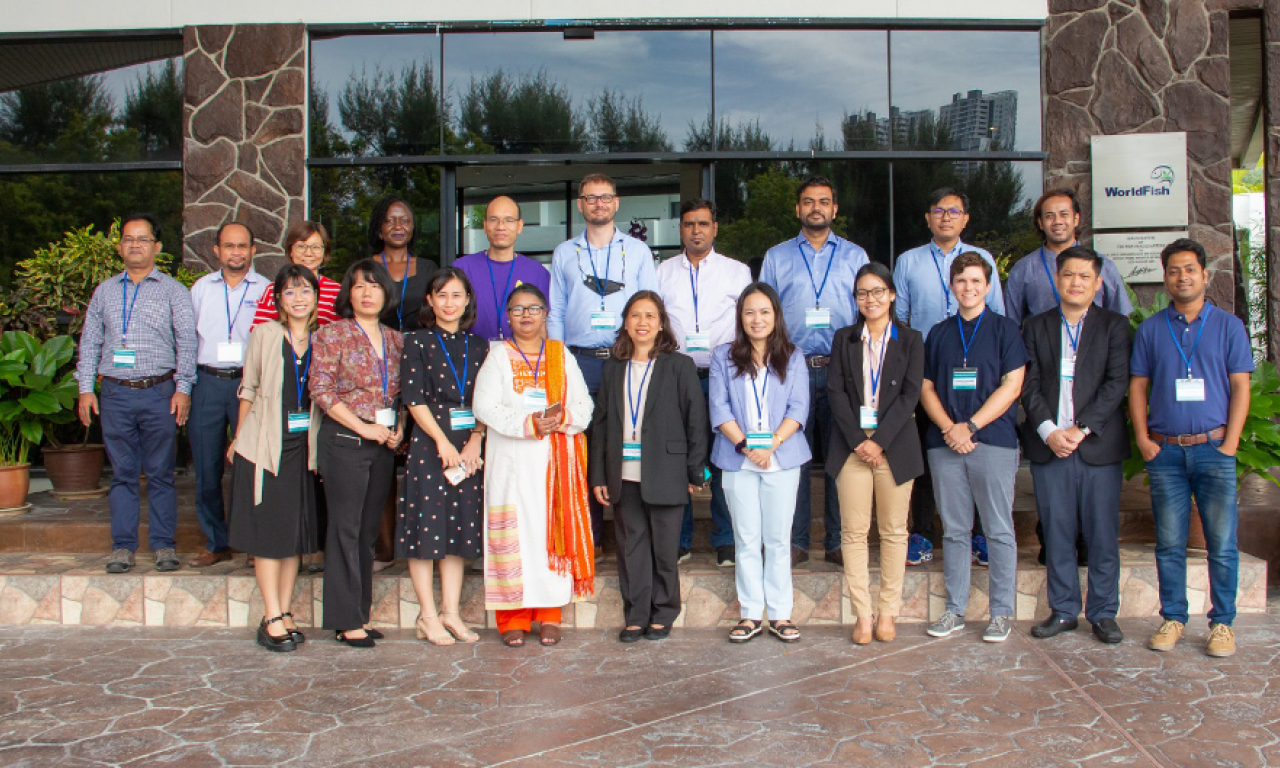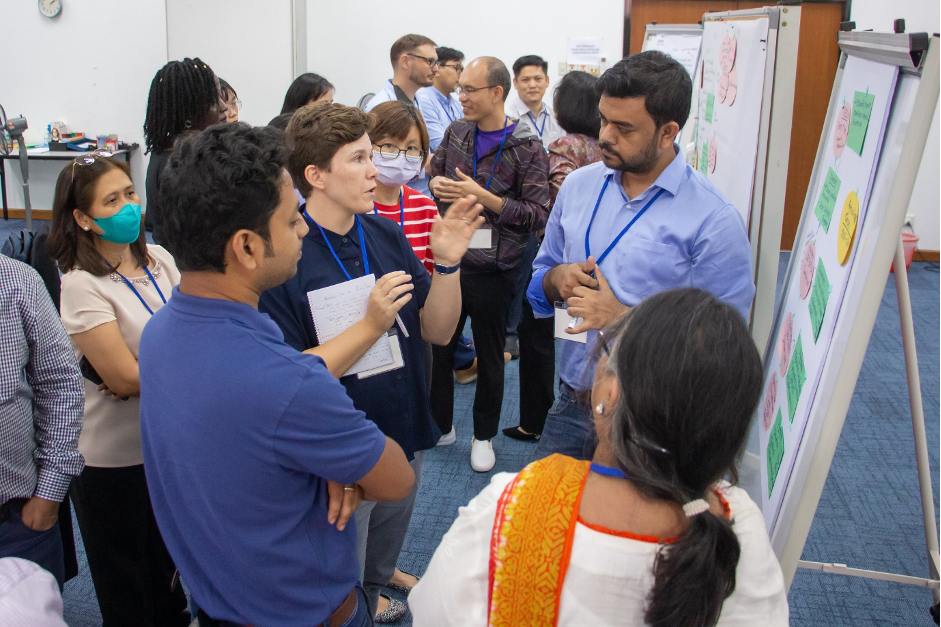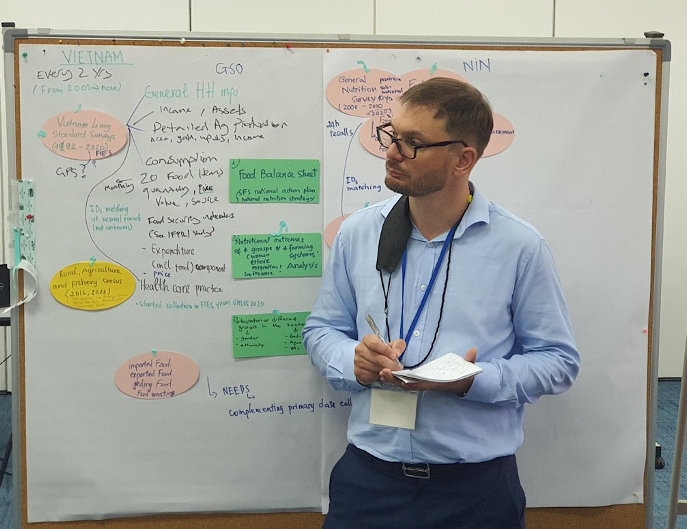
- Partners from Bangladesh, Cambodia, Vietnam and the Philippines attended the Asian Mega-Deltas (AMD) Initiative’s research planning and design workshop at WorldFish headquarters in Penang, Malaysia to develop holistic work plans to implement nutrition-sensitive approaches in policy and interventions to transform deltaic agri-food systems.
- Deltaic food systems are hit by serious impacts of climate change and climate extremes that will slow down economic growth, further erode food and nutrition security, exacerbate urbanization and migration challenges as well as trigger new poverty traps and emerging hotspots of hunger.
“I believe that all of you are familiar with nutrition-sensitive approaches but the challenge now is to understand how these approaches respond to different landscapes in the context of rapid change. We need to find ways to design nutrition-sensitive interventions that are acceptable, adaptable and scalable so that systems transformation can be achieved, leaving no one behind.”
With these words, Shakuntala Haraksingh Thilsted, WorldFish’s global lead for nutrition and public health, welcomed participants of the Nutrition-sensitive Deltaic Agri-food Systems’ Research Planning and Design Workshop held from 17 to 19 October 2022 at WorldFish headquarters in Penang, Malaysia.
The workshop aimed to gather all the partners involved in Focus Area 2 of the CGIAR Initiative on Securing the Food Systems of Asian Mega-Deltas for Climate and Livelihood Resilience (AMD) to provide a situational update on their work and develop detailed plans to implement nutrition-sensitive approaches to research and policy in their respective countries over the coming two years.
The workshop provided an opportunity for in-person participation and interaction by partners from Bangladesh, Cambodia, Vietnam and the Philippines. Representatives from the Alliance of Bioversity-CIAT (ABC), Bangladesh Rural Advancement Committee (BRAC), Cambodia Development Resource Institute (CDRI), Center for National Resource Studies (CNRS), International Institute of Rural Reconstruction (IIRR) and the Royal University of Phnom Penh (RUPP) were able to engage with each other to build trust and camaraderie that is often limited through virtual participation.
In the two-and-a-half days of intensive teamwork, the participants were able to identify new action priorities, synergies and opportunities for cross-country collaboration; further enhancing the potential for nutrition-sensitive outcomes from the AMD Initiative.
Sharing experiences on deltaic agri-food systems

The first day of the workshop focused on sharing experiences and lessons learned from conducting nutrition-sensitive research and policy engagement in the countries identified in the AMD Initiative. Partner and country presentations enabled participants to better understand the range of approaches adopted to integrating nutrition-sensitive approaches to project design and the scale and impact of these approaches in meeting national nutrition targets.
While each country has its unique context and approaches, there were also clear, shared understandings across countries that agri-food systems are threatened with anthropogenic pressures and climate change that risk exacerbating food and nutrition insecurity and poverty.
A multi-country analysis presented by Liz Ignowski from WorldFish’s operations in Cambodia elucidated the need for better measurement of micronutrient productivity and consumption to reveal the impact of nutrition-sensitive approaches on changing dietary diversity and quality.
Drawing on the presentations and findings from the first session, partner institutions identified country-specific objectives and priority actions for implementation under the AMD Initiative.
Using the food systems framework as a principle for implementation, Tuyen Huynh of the ABC was able to guide colleagues and partners to identify gaps, limitations and opportunities to integrate nutrition-sensitive approaches in the food systems transformation agenda of Vietnam.
This discussion was enriched by the expertise of colleagues from the National Institute of Nutrition (NIN) and experiences drawn from other projects implemented by CGIAR colleagues. Similarly, participants from Bangladesh and Cambodia also identified national priorities and agendas, enabling each partner to refine their work plans on the second day of the workshop.
The second and third days of the workshop were crunch times for the partners as they worked to develop time-sensitive and comprehensive work plans as well as identify the financial resources needed to support the implementation of the work.
Work plans were designed explicitly to be gender-sensitive, recognizing the need for deep gender awareness and social inclusivity in all stages of research design and implementation. This process was expertly facilitated by Nozomi Kawarazuka, a gender research scientist at the International Potato Center (CIP) in Vietnam.
Securing agri-food futures of Asian mega-deltas

“The event has been a great success in bringing together a diverse set of partners to co-design a cohesive agenda for transformative research and policy on food systems and nutrition in the Asian mega-deltas,” said Ben Belton, the AMD Initiative co-lead for WorldFish.
“The detailed country- and partner-specific roadmaps for implementation designed during the workshop will contribute to achieving AMD’s overarching goal of securing the food systems of Asian mega-deltas for climate and livelihood resilience,” added Belton, who is also the Focal Area 2 leader.
While the workshop has drawn to a close, the work of better integrating nutrition-sensitive approaches into agri-food systems transformation in the Asian deltaic regions is just beginning. As the world continues to grapple with the intensifying effects of climate change, it is important that strategic actions and policies can help de-risk and build resilience for deltaic communities, ensuring that these communities do not fall further into hunger and poverty traps, leaving no one behind.
###
CGIAR Initiative on Securing the Food Systems of Asian Mega-Deltas for Climate and Livelihood Resilience (AMD)
Home to 177 million people – 36 percent of them poor – the Asian mega-deltas are biodiverse, fertile and productive food baskets dominated by rice, fisheries and aquaculture that support millions within and beyond the deltas. However, deltaic food systems are hit by serious impacts of climate change, including more frequent and intense floods, salinization, water shortages and climate extremes that will slow down economic growth, further erode food and nutrition security, exacerbate urbanization and migration challenges and trigger new poverty traps and emerging hotspots of hunger.
Focus Area 2: Nutrition-sensitive Deltaic Agri-food Systems aims to ensure deltaic food systems are able to sustain and enhance nutrition security equitably in a rapidly changing climate. The first requirement of designing appropriate nutrition-sensitive interventions is to understand the characteristics of these systems and their socially differentiated nutrition implications.
